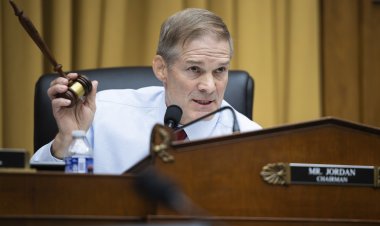Elizabeth Warren, J.D. Vance team up on bank CEO crackdown
Warren, a Massachusetts Democrat, and Vance, an Ohio Republican, worked hand-in-hand to craft the latest iteration of the bill and assemble key co-sponsors.


Sen. Elizabeth Warren’s push to hit the executives of failed banks with sharper penalties is getting a big boost from an unexpected conservative partner — Sen. J.D. Vance.
Warren on Thursday unveiled Congress’s most politically viable response yet to the economy-shaking collapse of Silicon Valley Bank, with a bill backed by 12 other senators that would require the government to claw back executive compensation at large failed banks in a bid to deter excessive risk-taking.
Warren, a Massachusetts Democrat, and Vance, an Ohio Republican, worked hand-in-hand to craft the latest iteration of the bill and assemble key co-sponsors — among them nearly half the lawmakers on the Senate panel responsible for potentially voting on the legislation.
“This is not just for show,” Warren said in an interview. “We actually want to make change, and we've got a bill where we can get this done.”
The compromise indicates that a thirst for banking industry accountability — one shared by President Joe Biden — persists on Capitol Hill nearly three months after the failure of SVB and other regional lenders. Warren's coalition is evidence that there may be sufficient political will to change policy.
With 11 of the Senate Banking Committee's 23 members on her bill, Warren said she has asked Chair Sherrod Brown (D-Ohio) to schedule a vote. A Brown spokesperson said holding failed bank executives accountable is a priority and that he’s working on the set of issues with committee members.
“My expectation is Sen. Brown will want to bring it up in the next couple of weeks in a markup, and then onto the Senate floor from there," Vance said in an interview. "I feel pretty optimistic about where things are.”
Warren's bill would require the FDIC to claw back from the executives of large banks compensation that they received over the three years preceding their institution's failure or FDIC resolution. The measure would cover banks with $10 billion or more in assets — carving out the smallest "community" banks — and apply to directors, officers, controlling shareholders and other high-level individuals involved in decision-making.
It comes as the FDIC and other financial regulators revive work on rules that would impose new restrictions on executive pay to curb unbridled risk-taking.
Sen. Josh Hawley of Missouri is the lead Republican on Warren's proposal, having signed on to an earlier version that she circulated in March with Sens. Catherine Cortez Masto (D-Nev.) and Mike Braun (R-Ind.).
Warren turned to Vance as she sought to build GOP support on the Banking Committee where they both serve. Vance said Warren approached him after he publicly criticized how SVB was run.
Vance — a venture capitalist and author — helped address Republican concerns about the scope of Warren's original plan. The carve-out for small banks was one of the key negotiating points.
In addition to Vance, Senate Banking Republican Sens. Katie Britt of Alabama and Kevin Cramer of North Dakota have signed on to the bill.
"J.D. and I went back and forth on the details about how to do this," Warren said. "Lots of texting late at night and early in the morning and some weekend phone calls. But we got the pieces right. And once we did, we were able to talk with others — both Republicans and Democrats — to begin to build some momentum around it."
Warren's Democratic co-sponsors on the Senate Banking Committee, in addition to Cortez Masto, include Sens. Bob Menendez of New Jersey, Mark Warner of Virginia, Tina Smith of Minnesota, Raphael Warnock of Georgia and John Fetterman of Pennsylvania and Chris Van Hollen of Maryland.
"People had different perspectives on how to look at it, but ultimately I ended up with a great set of partners here who care about not letting these corporate executives enrich themselves and push the risks off onto everyone else," Warren said.
It’s unclear to what extent the idea will gain traction in the GOP-led House. Rep. Ann Wagner of Missouri, a senior Republican on the Financial Services Committee, said in an interview Wednesday that executives at failed banks already face enough punishment because they lose their jobs. She said lawmakers should focus on protecting depositors.
“The question in the House is always one of priority,” Vance said. “My hope is by late summer, next fall, we can get the House to take this up.”
Eleanor Mueller and Victoria Guida contributed reporting.












